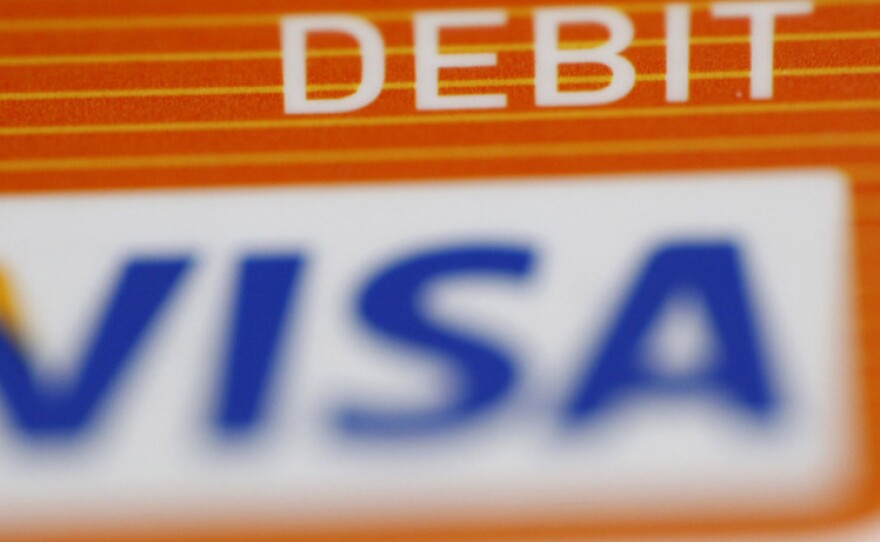There's a new kind of plastic on the rise.
Prepaid debit cards are the fastest growing of all electronic payments, according to a new report by the Federal Reserve System. U.S. consumers loaded $28.6 billion on reloadable prepaid debit cards last year -- more than double what they did in 2007.
In an increasingly card-based economy, issuers of prepaid debit cards say they are offering an affordable alternative for the millions of unbanked and underbanked Americans. But consumer advocates warn that the industry needs more regulation, as some cardholders face hefty fee schedules to access prepaid debit.
The Convenience Of Prepaid
Consumers are drawn to the convenience of using prepaid debit cards, Terry Maher tells NPR's Audie Cornish. Maher is general counsel of the Network Branded Prepaid Card Association (NBPCA), an industry group, and has spent the past 25 years advising financial institutions on their prepaid card businesses.
Prepaid debit can be used anywhere the card's brand, such as Visa or MasterCard, is accepted.
"It's a lot safer than carrying cash … [and] the consumer can better budget and keep track of what they're spending," adds Maher.
Prepaid debit cards can also ease the worries of gift givers, allowing recipients to purchase their own gifts with the cards.
The Cost Of Prepaid
But the convenience of prepaid debit cards comes with a cost, says Adam Levitin, a law professor at Georgetown University who specializes in financial regulation.
"You don't have to worry about going over limit or overdraft fees, but there are plenty of other problems with prepaid debit cards," Levitin says.
Those problems come up because prepaid debit cards are largely unregulated, Levitin says, and as a result, some cards charge fees that can easily reduce the stored value even before the card is used.
Consumers often assume that the purchase price is the only cost of using a prepaid debit card, but some cards also charge activation fees, monthly maintenance fees, cash withdrawal fees, reloading fees and even inactivity fees.
Ripping Off Consumers?
A prepaid debit card launched by the Kardashian sisters of the cable TV show Keeping Up with the Kardashians was recently pulled off the market after receiving criticism for its fee schedule and its appeal to financially unsophisticated teenagers.
Levitin says the RushCard offered by hip-hop mogul Russell Simmons is another example of a prepaid debit card that charges high fees. Consumers can choose from four different RushCard designs, with purchase prices ranging from $3.95 to $14.95, and monthly plan users pay $9.95 each month in maintenance fees.
"[Simmons has] lent his name to this prepaid product, which he likes to market … that he's helping low- to moderate-income communities because it helps them avoid going to check-cashing outlets, which can be very expensive. But he's just replacing one form of expensive financial services for the poor with another, and it's hard to say which is really better," Levitin says.
A Solution For The Un- And Underbanked?
Maher says prepaid debit cards help meet the needs for the millions of unbanked and underbanked in the U.S.
"We're providing a solution to a community that otherwise would have a great difficulty in participating in everyday activities," Maher says.
At least 17 million unbanked adults do not have a checking or savings account, according to a 2009 survey by the Federal Deposit Insurance Corporation. The underbanked represent about 43 million adults who have a bank account but rely on alternative financial services such as check-cashing stores and payday loans.
As the cost of keeping low-balance checking accounts rises, prepaid debit cards provide a more affordable option for increasingly more consumers, Maher says.
Regulation Prospects
Regulation of the growing prepaid debit card industry will most likely come from the newly established Consumer Financial Protection Bureau, but don't expect it anytime soon, Levitin says.
In the meantime, Maher says competition between major card issuers will drive fee reduction for some prepaid debit cards.
Still, Levitin warns that consumers on the market for prepaid debit cards will have to be careful.
Copyright 2022 NPR. To see more, visit https://www.npr.org. 9(MDAzMjM2NDYzMDEyMzc1Njk5NjAxNzY3OQ001))






